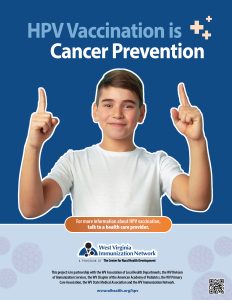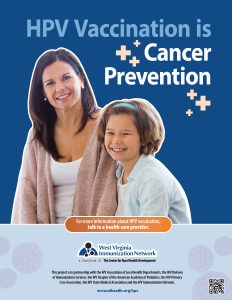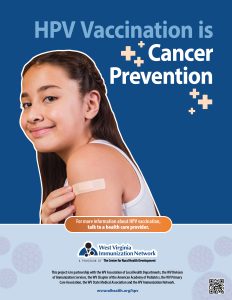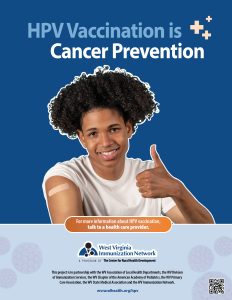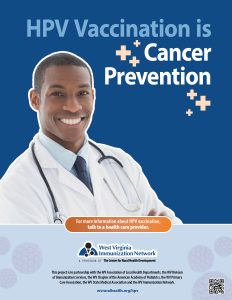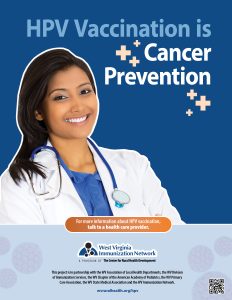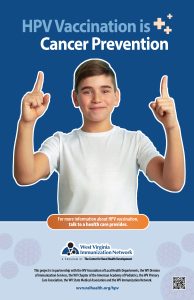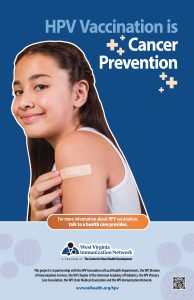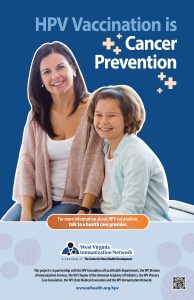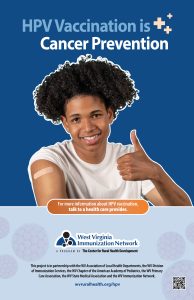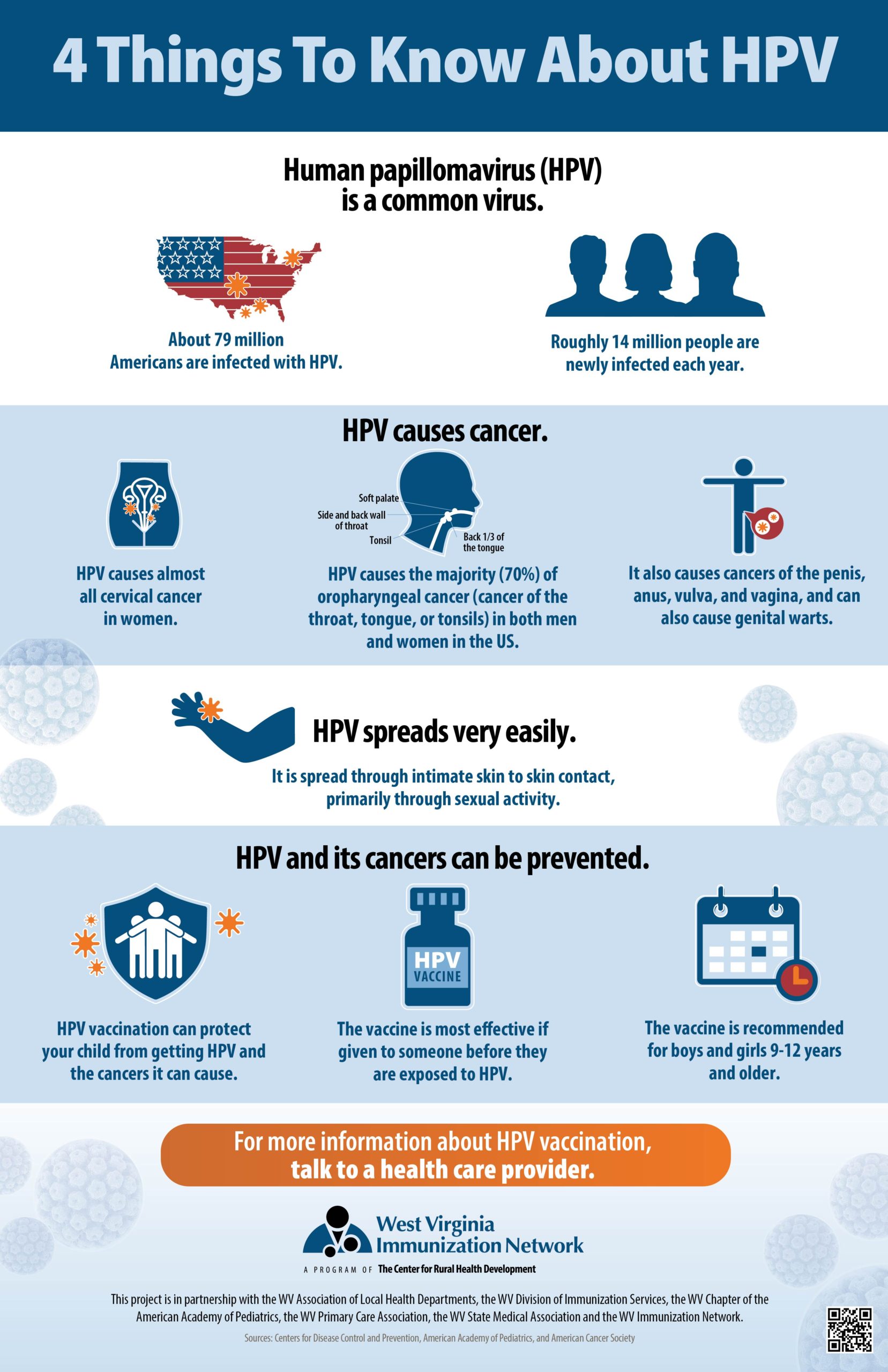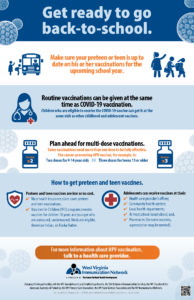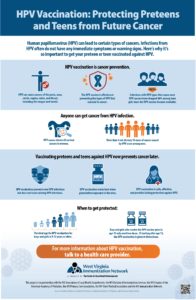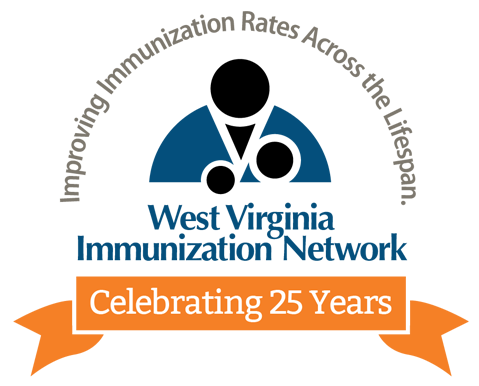HPV Vaccination Materials
Below are some helpful tools that have been developed in partnership with the WV Association of Local Health Departments, the WV Division of Immunization Services, the WV Chapter of the American Academy of Pediatrics, the WV Primary Care Association, the WV State Medical Association and the WV Immunization Network, a program of The Center for Rural Health Development. The following infographics and downloadable posters/flyers feature data-driven messages about the role of HPV vaccination in cancer prevention. These materials can be downloaded from this page to print, copy, and distribute to your communities. Some can also be ordered free of charge here.
Getting Caught Up on Vaccinations for a Safe Return to School
Now’s the time to get caught up on your child’s vaccinations // Make a plan with a health care provider today about getting your preteen and teen up-to-date on their vaccines before the start of school
Protecting Preteens and Teens from Future Cancer
Human papillomavirus (HPV) can lead to several types of cancer. Vaccinating your preteen or teen at the recommended ages can help to protect them from cancers caused by HPV later in life. HPV Vaccination is cancer prevention.
HPV vaccination is cancer prevention!
HPV vaccination is cancer prevention!
Human papillomavirus (HPV) is a very common virus. About 79 million Americans are infected with HPV, with roughly 14 million men and women becoming newly infected each year. According to the Centers for Disease Control and Prevention (CDC), HPV is so common that most American men and women will contract at least one type of HPV during their lifetime.
HPV is the cause of almost all cervical cancer in women and the majority (70%) of oropharyngeal cancer (cancer of the throat, tongue, or tonsils) in both men and women in the United States. It can also cause cancer of the penis, anus, vulva, and vagina, and can also cause genital warts.
About 92 people are diagnosed with a cancer caused by HPV in the U.S every day. These patients and families face the emotional impact of a cancer diagnosis, the challenges of cancer treatment and the possibility of death.
Call to Action
According to the State Cancer Profiles, West Virginia has the eighth highest incidence and the fifth highest mortality rate of cervical cancer in the nation. In 2019 there were 2,000 HPV-associated cancers in West Virginia alone. An alarming percentage of these were oral-pharyngeal cancers in both men and women. Yet these cancers, in addition to vaginal, vulvar, and anal cancers can be prevented with HPV vaccination.
Although, there is overwhelming evidence of the HPV vaccine’s safety and effectiveness, HPV vaccination is underutilized in WV. While vaccination rates continue to improve for the other adolescent vaccines, HPV vaccination rates are not improving as quickly. Given the high rates of Tdap and MenACWY vaccination in WV, but low rates of HPV vaccination, this data suggest that when patients are 11 or 12 years old, they are not receiving the HPV vaccine, even though it can be co-administered with other routine vaccines.
A clear recommendation by a health care provider for HPV vaccination, given at the same time and in the same way as the other adolescent vaccines, is the most effective strategy for improving HPV vaccination rates.
How to Make an Effective Recommendation
Minnesota Department of Health has created a 12-minute video for health care providers on HPV vaccine communication. The video begins with humorous vignettes and then presents four model clinical encounters in which providers demonstrate low-stress ways of recommending HPV vaccine and answering questions from patients and parents. Each of the model encounters can also be viewed individually.
Additional HPV Vaccination Resources
The CDC’s You are the Key to HPV Prevention website.
This online toolkit includes continuing education opportunities, provider fact sheets, schedules and recommendations, HPV vaccination coverage data, tools and materials for your office, information to provide to parents, and content syndication.
American Academy of Pediatrics HPV Vaccination Toolkit
This toolkit includes information on making a change in your office, what’s new with HPV vaccine, grand rounds / resident teaching sessions, CME / MOC activities for clinicians, video clips, printable resources, public communication, and success stories.
Steps for Increasing HPV Vaccination in Practice, by the American Cancer Society
An Action Guide to Implement Evidence-Based Strategies for Clinicians.
The American College of Obstetricians and Gynecologists’ HPV Vaccination Toolkit
This toolkit includes materials to help you and your staff communicate with patients about the importance of receiving the HPV vaccine. It includes Tear Pads for Patients, Committee Opinion 641, a HPV Coding Card, HPV Patient Letter, Physician Script, Infographic Posters, Rx pad for HPV Vaccine, and more.
Someone You Love: The HPV Epidemic
Someone You Love: The HPV Epidemic documentary reveals just how dangerous HPV can be, causing six different types of cancers in both men and women. Following five brave women’s stories who are afflicted by HPV and cervical cancer, the film also interviews some of the world’s top experts on the common disease, HPV. How to view the film…
- To order DVDs, screening licenses, and more, visit the film website.
- The general public can view the video free of charge through PKIDS website (click on the film image).
- Nurses can view the video and receive 1.5 hours of free nursing CEUs through the WVU School of Nursing.
Immunization Action Coalition’s HPV Webpage
HPV Vaccine Myth Busting for Health Care Providers Social Media Toolkit
This toolkit, from the GW Cancer Institute, is designed to help public health professionals establish a “Myth Busting” social media strategy to encourage providers to effectively talk to parents and adolescents about the HPV vaccine.
Materials from the West Virginia Immunization Network
- Faces of Vaccine-Preventable Diseases videos: these short videos feature individuals who have been affected by or lost a family member to a vaccine-preventable disease. The videos are available here (scroll down for the HPV/cervical cancer videos) and can be embedded in your own website.
- HPV vaccination poster for college students: this 11×17″ poster can be ordered by healthcare facilities, universities and others in West Virginia free of charge by contacting the WIN Program Manager. A printable 8.5×11″ flyer can be printed here.

